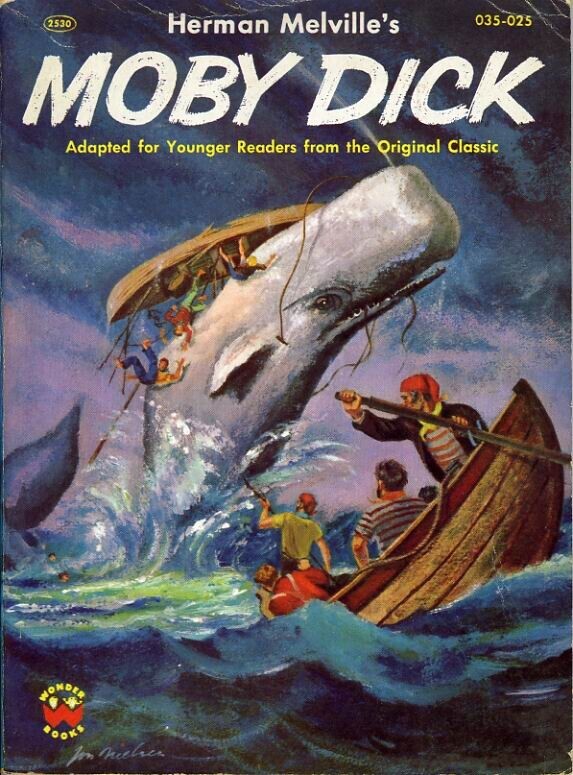I read “Moby-Dick” in high school, and then again in college, but that was a long time ago. It’s hard to enjoy the books you read in school, because you did not choose them yourself, and often they require adult perspective that you lack. Also, for me at least, I think the school process required thinking too much about books too soon.
I think the first time you read a novel, you should just experience it, the way you would a TV show or popular movie, and not spend too much energy on analysis. The delay between reading and analyzing can be a few minutes or a few hours, but you should let the analysis flow naturally and organically.
When you’re reading for school, the analysis is the whole point, and you’re instantly thrust into the icy cold waters of symbolism, themes, etymology, Christ imagery, and all that literary stuff, without an opportunity to get used to it.
I do remember enjoying a few school reading assignments. One was a Stephen Vincent Benet short story called “By the Waters of Babylon,” about a barbarian centuries in the future exploring the ruins of a 20th Century city. Another was “Alas, Babylon,” by Pat Frank, about a small town in Florida that survives a nuclear war. The third was “Lord of the Flies,” for which I enhanced my enjoyment by reading one chapter ahead of the assignment, so it was more like I was reading at my own pace.
I remember a few things about my high school encounter with “Moby-Dick.” It has the reputation of being the Great American Novel, the pinnacle of book-length prose fiction, alongside “Huckleberry Finn” and, well, that’s it. Those two. The two best novels ever produced by American writers.
“Moby-Dick” has the reputation of being difficult to read.
I recall our high school teacher saying that many people in the 19th Century read it as an entertaining adventure story. As she said this, she seemed to be looking down on those people. The better people read for the symbolism and themes and all that good literary stuff, she said.
Another thing I remember is the passage at the beginning, where Ishmael meets Queequeg and they share a bed and Ishmael wakes up with Queequeg holding him like a wife. Later, there’s a big scene where all the sailors on the ship are sitting around squeezing sperm. My high school teacher said this was definitely not gay, nope nope nope, and we were all being childish for thinking it was and she was disappointed in us.
For these and other reasons, I think my high school English teacher was not very good.
Then I was assigned to read the book again in college, and the professor said of course it was gay. It’s a big gay novel. But we did not talk abut it much because this was the mid 1980s.
I also remember something about the whiteness of the whale being horrific, and something about the whales swimming in various depths of ocean being like layers of reality.
And oh yeah everybody dies except for Ishmael, the narrator. Should I have put in a spoiler alert for a 171-year-old novel? Sorry.
Within the past few months, I’ve started encountering the idea that “Moby-Dick” is actually an enjoyable novel to read. For fun. As one would watch a TV show or see a popular movie, or read any other novel. The first time was on the Hugo Girl podcast in January, which is a fun series featuring three millennial women talking about books, their friendship, and whatever else comes to mind, with lots of laughing. Usually they talk about Hugo Award winning science fiction and fantasy novels, but this time they decided to do a special episode on “Moby Dick.”
The second was here, where someone translates one of the first sentences of “Moby-Dick” into Zoomer-generation language. Before:
“… whenever my hypos get such an upper hand of me, that it requires a strong moral principle to prevent me from deliberately stepping into the street, and methodically knocking people’s hats off–then, I account it high time to get to sea as soon as I can. This is my substitute for pistol and ball.”
Translated to 21st Century language: “yeah so a few years back i was thinking about going joker mode on a crowd of innocent bystanders, but then i realized i was getting too blackpilled so i decided to get a job.”
According to this online annotated Moby-Dick,, “hypos” means “periods of depression, anxiety, or ennui.”
Ishmael is saying that when he starts feeling depressed or anxious, he has to resist temptation to just go out into the street knocking people’s hats off—or get out a gun and kill people. When that happens, instead he goes to sea.
That’s contemporary.
And dark.
I found it intriguing.
































































